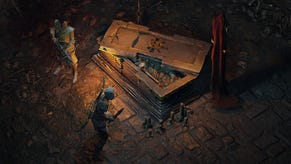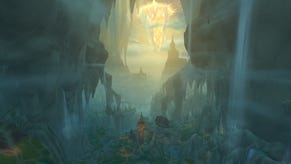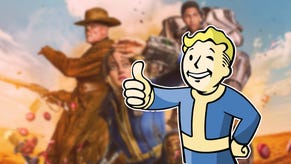How Train Simulator healed a CEO's shattered childhood dream
Paul Jackson, the CEO of Dovetail Games, developer of a range of train and fishing simulators, has previous with targeting seemingly niche audiences.
Back in 2000, video games were predominantly seen as a male pastime. All the magazines were geared towards men, all the writing about games was men writing for men, and all the games were targeting that same demographic.
The Sims was an outlier at that time - a game conceptualised by women and with women as its main target audience. Jackson, back when he worked for EA, helped to launch the series in the UK.
“What was interesting was we were able to see that young women were playing video games, but they weren’t buying them,” Jackson tells me as we sit together in Dovetail’s conference room. “They were having them bought for them, and so we had a whole programme of reaching out to young women through magazines like Sugar and Bliss.
“I can remember being told I was nuts for advertising in those magazines, because it had just never been done before. But we reached out to that audience, and it really worked. More people in Britain played it as a percentage than any other country in the world.”
The original pitch for The Sims was as a virtual dolls’ house. And while it might be quite loose as a “sim”, it shares a lot of lineage with traditional simulation games, expecting you to micromanage every aspect of your sims’ lives. When it came to running Dovetail, the goal was to target another niche market in train fans, while the original pitch was: “What would a virtual train set look like?”
“They end up being very different things to that initial concept,” Jackson explains. “Certainly The Sims has gone in the direction it’s gone, and Train Simulator has become very much more about recreating, simulating in a very hard sense, the world. But at the heart it was, ‘dolls’ house, train set’.”
While being the CEO of a successful company is something many would aspire to, game development wasn’t Jackson’s first career choice. In fact, his dream job was to be an actual, honest-to-god train driver. The only thing that stopped him in his tracks was the fact he’s colourblind, like me and eight percent of the world’s male population. Still, even if Jackson’s dream had come true, it wouldn’t have been quite as he imagined it as a wide-eyed child looking longingly towards the tracks.
“There’s only two massive problems with my dream, and it’s still my dream,” he says. “When I was fifteen or sixteen, the trains I wanted to drive had gone. They hadn’t been gone long. You know, the steam trains that I wanted to drive had been only gone for probably twenty years, but they were gone. I wanted to get up at six o’clock in the morning and drive the seven o’clock to Manchester. That was the life I wanted. And it had gone, so it was impossible to do.”
With technology, though, nothing is impossible.
Jackson is genuinely enthusiastic about trains. He looks at the people who drive them with reverence, noting how they hold thousands of lives in their hands every day, and how, to the passenger, the process of getting from A to B can appear automated, even though it’s very much not. It’s the precision that creates this illusion - hitting each turn at the right speed and pulling into the station so that all the doors line up with the platform just so.
“What they do is incredibly important, and they are almost a breed apart, train drivers, when you spend time with them,” Jackson says. “It’s hard to express just how focused they are on safety, how focused they are on professionalism, and this duty to their customers, to their passengers, to get them safely home. And it comes through in ways you wouldn’t expect it.
“I can remember just chatting with the top driver, the head of trains on Virgin West Coast. We were standing having a coffee in their crew train area, and he noticed a pool of water, about the size of an iPhone on the floor. And essentially just said, ‘Everybody stop, stand back.’ He got the towel himself, didn’t call for anybody. He got a towel, he wiped it up, and once the flooring was safe, he said, ‘Right, okay, off we go. Let’s talk again.’”
“The driver sits there, drives the train up to 140 miles an hour, and he has got alarms going off that he has to react to, he has got signals coming at him. He is more like an airline pilot than an airline pilot. I’ve sat in the cabins of planes, and planes are fabulous creatures, now, that do most of the flying themselves.”
Dovetail estimates that there are around 100 million train fans just like him around the world, and the developer hopes to fulfill those same childhood dreams that Jackson was forced to abandon. He also hopes the games reach beyond their intended audience, infecting more people with an enthusiasm for trains and railways.
“I really hope that it’s helping to extend train fandom,” he tells me. “At heart, train fandom is a good thing. There’s no violence attached to it. There’s no addiction attached to it. There are so many bad things in the world, and surely train fandom, along with reading books, and being a soccer fan, these are all good things that should be celebrated and extended to people who are interested.”
Non-violence is part of Dovetail’s core values - creating experiences that put out pure joy into the world, without slipping into the darker themes many of the blockbusters lean into.
“No criticism at all of anybody else and what they do, but what we do, we want to enhance people’s lives,” Jackson explains. “And I don’t believe that guns help people find that, for instance. That’s not what I want to do with my life. And I’ve been there, you know. I’ve been in companies, I sold games with guns in. I make no apologies for any of that. I’m just saying, now I’m in my own company, that’s not what I want to be doing.”
Some will argue that video games exist as an escape from reality, while others will argue that they’re power fantasies and others will say that they’re art. But there are other kinds of fantasy outside of exerting physical dominance over another person, such as getting up at 6am to drive a train to Manchester, or landing a massive carp without buying the expensive gear.
Dovetail’s aim is to serve these people who fantasise about chugging along the tracks. Part of that hope comes from Jackson’s dream of being a train driver, and part of it comes from his experiences helping to set up the PEGI ratings system.
“Establishing the PEGI system was a real eye-opener for me, because it made me focus on how powerful video games are as a medium,” he remembers. “What a powerful art form they are, and how art forms really impact people. We can’t hide behind, ‘We’re only games.’ Back then there were people in the country who still thought games were just games, and therefore kind of irrelevant. We all had been tarred with the same brush that comic books were tarred with in the ‘50s and ‘60s. And it forced me to engage full-time in both the positive side and negative side of video games. Nobody was thinking about it.”
Even now, in 2020, the games industry has a tendency to hold up positive examples of games - where a game experience has helped someone cope with some tragedy, or where a story has opened someone up to a new way of thinking. But if that’s true for positive effects, we have to be open to the fact that games can impact us negatively as well, without defending them as a reflex whenever someone speaks out against them.
I think part of the reason for that defensiveness is because of how games were treated back in the day, but it’s also because of studios like Dovetail and indie games like Stardew Valley - pure experiences do exist and put out nothing but positive vibes into the world. These are proof that games are a force of good, surely? But you have to look at both sides.
Video games are about emotions - it’s feelings that we remember most, whether that’s excitement, fear, awe, or relaxation. Sims are unique in this sense, because they are often about menial tasks, or mastering something specific that many people do as an actual job in the real world. So what emotion does Dovetail hope to elicit with its peaceful train simulations?
“We don’t try and force any emotions on our customers,” Jackson explains. “We let their emotions emerge. I can tell you what I feel, and it came together for me the other day when I was driving a train over the Pennines in Train Sim World.
“So I’d been over the top of the Pennines, and I was coming down the other side, I was driving quite a heavy train. It was a locomotive that had been built in 1950, so its suspension wasn’t as good as a modern train suspension would be. And I shut the power off, and I was just rolling down under green lights, and the locomotive started to buck as we were coming up to curves, and it was starting to really shake and roll as we were coming down. And just this feeling of, ‘Oh my goodness, I’m really there.’ It was thrilling. It was completely thrilling to me to be in that place at that time. I completely lost touch with where I was, when I was. And I was there doing that thing, and it was just an incredible sense of excitement. And I thought, ‘Oh, yes. That’s it. That’s it, we’ve cracked it there, we’ve actually cracked it.’”
While Train Sim World doesn’t simulate crashes or a train derailing, there’s a slight danger that you can come off the track, at which point the simulation ends, therefore ending the fun. So it’s less of a traditional excitement that comes from a fear of failure, but more an all-encompassing feeling of existing in that place. I’ve always found it fascinating how being in a virtual space you’ve seen before in the real world - be it Assassin’s Creed 2’s Venice or GTA 5’s take on Los Angeles - heightens your enjoyment of existing there virtually. Even virtual clouds can be more alluring than looking out of your window.
“I can’t make any of this stuff, I’m not that guy. I’m not technical,” Jackson explains of his role in recreating these virtual railways. “I have a vision, and then I employ people that are much cleverer than me, to try and bring that vision to reality. I get to be the guy who says, ‘This is what we do.’ I mean, I turn around and look at all this awesome stuff, and it completely thrills me at times. So we’ve just put out East Coastway which is the most photo-real, in my view, expression of trains on that line down the south coast of England, and I look at it and think, ‘How on earth did we do that? How did we do that? How can we get that into a console?’”
So where does the future lie for the kinds of simulations Dovetail puts out? Traditional games are all battling for higher fidelity graphics, but eventually we’ll hit photorealism and we won’t have anywhere else to go. How does a genre like this evolve in that scenario?
“At the moment, Train Sim is really quite focused around the driving experience,” Jackson explains. “But what is it to be an actual driver and go through a complete career? You know, we haven’t explored that in great depth yet. What would it be like to be a train fan who is still at school and experiences their train fandom by standing on a platform, or going on a trip? We’ve not explored that as far as we can.
“Then we’ve got the whole world of model railways, which is yet another experience of train fandom that we can explore over time, explore it quite well with our first Train Simulator. We’ll get there on our second Train Simulator, where you can create your own environments, or you can affect your own environments. And all of those are areas of this huge interest in trains that we can explore for our customers over the coming decades.”
Perhaps one day we’ll get to a point where you’re taking your coffee breaks and mopping up hazardous spills, really leaning into that train driver fantasy.
Dovetail's latest, Great British Railway Journeys, is out now on Steam.












_ddwYK80.png?width=291&height=164&fit=crop&quality=80&format=jpg&auto=webp)



